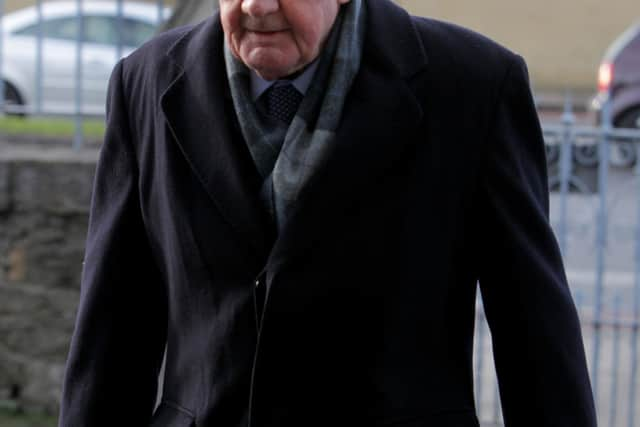Ruth Dudley Edwards: Des O’Malley warned Ireland about Sinn Fein populism


It was a time when I was settled in London, quite often visiting my parents and friends in my native Dublin and one of my closest friends, Liam Hourican, then the Northern Ireland RTE correspondent.
On the night of March 3, 1972, I was in Belfast for a small party celebrating the christening of the third Hourican, Bridget.
Advertisement
Hide AdAdvertisement
Hide AdThat week, Liam had been kidnapped by the Provos who threatened to kill him as a spy and grudgingly released him only because he had the phone number of a senior IRA contact.


Among the guests was SDLP leader Gerry Fitt, whom I drove home.
Henry Kelly, the Irish Times correspondent, was beside me telling me how to avoid potential assassins, and a very drunk Gerry, in the back, was rather disconcertingly waving a gun around, because brave as he was, he was permanently on edge.
His life, family and house were under constant siege by the IRA, who would finally drive him out of politics and his own city.
Advertisement
Hide AdAdvertisement
Hide AdThe following day, security measures prevented us from going into Belfast, for it was the afternoon of the Abercorn disaster, the IRA bombing of a teashop which murdered two young women and injured over 130, mutilating many.
It was a terrible time, but I wrote in 1993 in my obituary of Liam that, “being shot at, kidnapped and threatened with death heightened his joie de vivre and reinforced his burning commitment to fight the IRA and their perversion of the Irishness”.
He was fearless, but also openminded, and he effortlessly made friends from all backgrounds and all shades of opinion and learned from all encounters, so it was no surprise that he was friendly with unionists like John Taylor and Bill Craig.
Liam saw his main mission as being to knock sense into the Irish nationalist world from which he had come.
Advertisement
Hide AdAdvertisement
Hide AdAfter he was moved to Dublin in 1974, he gave a lecture on RTE called ‘The Irish Dimension’ that began: “Two preconceptions cripple our understanding of events in Northern Ireland, and our ability to assist towards a solution there. They are, the belief in the existence of one historic Irish nation to which all Irishmen properly belong, and the belief that British imperialism is still at work in Ireland.”
Unionists were essentially invisible to nationalists, he said, who shared “a long habit of self-delusion about the nature of the northern problem, a wish to believe that unionists are less determined and more divided than they really are”.
They had “a spectrum of attitudes running from the view that the Northern Protestants are a lost tribe which will one day return to us, to the much more hostile, but not unrelated belief that they are an incorrigible colonial remnant who may conform or get out”, which “has done much to foster the emergence and the continued activism of the Provisional IRA”, which provided a climate of tolerance and “supplied the Provisionals with their internal self-justification”.
Some things never change.
Des O’Malley was 31 when in May 1970 he became minister for justice at a time when Fianna Fail Taoiseach Jack Lynch was trying to cope with the Arms Crisis and pressures from hardline republicans to unite Ireland by force.
Advertisement
Hide AdAdvertisement
Hide AdA lawyer and a very brave man, both morally and physically, he beefed up security measures making it possible to convict someone of IRA membership on the word of a garda superintendent and re-instating the three-judge Special Criminal Courts to prevent jury intimidation .
Tragically, his plans to introduce internment without trial for IRA suspects in the Republic were not implemented.
For his three years as justice minister, O’Malley lived like a northern politician, with daily threats to him and his family, having a gun with him at all times, heavy security, safe houses, and, having his father-in-law’s pub in Omagh blown up twice.
He saw as clearly as Liam Hourican, denouncing the original Article 3 of the Irish Constitution as “an unequivocal claim of right on the part of the people south of the border to impose their parliament, their constitution, their laws and their values on the entire population of the island”.
Advertisement
Hide AdAdvertisement
Hide AdO’Malley achieved much in his courageous life, not least in clipping the wings of Charlie Haughey by founding the Progressive Democrats to challenge a corrupted Fianna Fail party.
In his memoir, Conduct Unbecoming, in 2014, he gave a warning about the populism of modern Sinn Fein, its utter negativity, its hypocrisy in the south in condemning policies they implement in the North.
“Time may have passed, and relative peace delivered great progress, but before giving their support to Mr Adams and his friends people would be well advised to remember their background and the terrible things they have done that sullied the name of Ireland.”
Nationalists should remember that modern Sinn Fein leaders make no apologies for the Abercorn or any other bombing outrage, or the war of terror they conducted against democratic politicians.
Until they do, no democrat should vote for them.
Advertisement
Hide AdAdvertisement
Hide AdUnfortunately, unlike O’Malley and Hourican, the majority of nationalists seem to be very slow learners.
——— ———
A message from the Editor:
Thank you for reading this story on our website. While I have your attention, I also have an important request to make of you.
With the coronavirus lockdown having a major impact on many of our advertisers — and consequently the revenue we receive — we are more reliant than ever on you taking out a digital subscription.
Subscribe to newsletter.co.uk and enjoy unlimited access to the best Northern Ireland and UK news and information online and on our app. With a digital subscription, you can read more than 5 articles, see fewer ads, enjoy faster load times, and get access to exclusive newsletters and content. Visit https://www.newsletter.co.uk/subscriptions now to sign up.
Advertisement
Hide AdAdvertisement
Hide AdOur journalism costs money and we rely on advertising, print and digital revenues to help to support them. By supporting us, we are able to support you in providing trusted, fact-checked content for this website.
Ben Lowry
Acting Editor